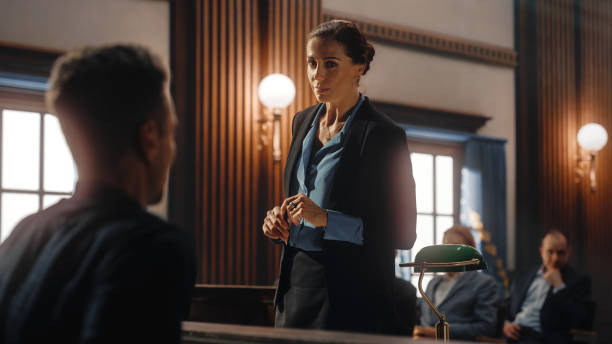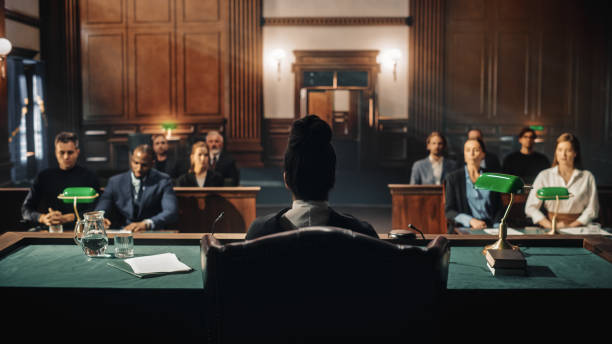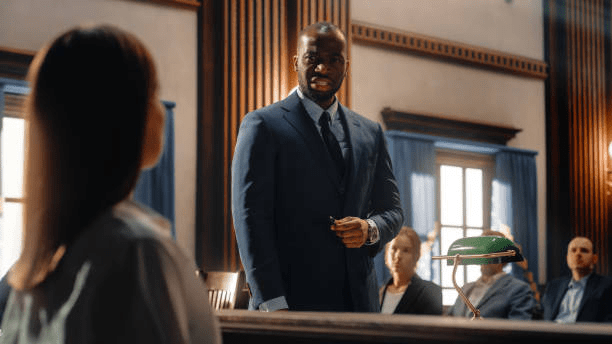A lawyer performs cross examination in order to expose gaps in the witness’s evidence. In movies or dramas, this is where the lawyer keeps questioning a witness in order to find out if they are telling the truth. The prosecution can also challenge any oral testimony that defendants present by cross-examining defence or prosecution witnesses.
In general, the first party who may question a witness is the first party who asked the witness to attend court. Then, another party has the opportunity to question the witness about any evidence they have given. Any parties to the proceeding other than the party who summoned the witness may cross examine any witness that is present to testify. However, there are several restrictions to this rule.
In some circumstances, offenders may even decide to represent themselves in court to get a chance to personally cross examine their victim. A lawyer cannot cross-examine a witness who has come solely to submit document/s. This happens if courts have not examined the documents in chief.
Similarly, if a witness comes to the court accidentally and if courts determine that they are unable to provide evidence that is pertinent to the case, that individual is nonetheless admissible. Read on to know more about cross-examinations in court proceedings.
Uniform Evidence Acts and Other Relevant Laws
The common law, the Uniform Evidence Acts and other legislation place limits on what lawyers can ask during cross-examination. The Civil Procedure Act 2005 NSW is an act that governs the practice and procedure in civil proceedings. Another relevant law is Section 40 of the Evidence Act 1995 (New South Wales).
Section 40 of the Act states that a party may not examine a witness who was called in error and has not been questioned about a matter relevant to a question to be decided in the proceeding. The Criminal Procedure Act 1986 (NSW) was amended in April 2018 so that committal hearings no longer exist. The committal hearing has several purposes, including the:
- Elimination of weak cases
- Disclosure of significant prosecution evidence
- Early identification of guilty pleas
- Case rehearsal
- Issue clarifications
In New South Wales, the new processes of charge certification and case conferencing has replaced committal hearings. These laws exist to protect the rights of witnesses while allowing criminal defendants to receive a fair trial.
Importance of Cross Examining a Party’s Evidence
It is important to conduct cross-examination in a way that prevents the creation of unreliable witness evidence or prior inconsistent statements. The opposing party may object to a cross-examination question if they believe it would lead to the admission of unreliable evidence. Furthermore, the court may either leave the question out or permit the cross-examining party to continue.
The court may order both sides to provide evidence to back up their claims when it is unclear whether a question is appropriate for examination. Indeed, it is necessary to conduct cross examinations in court proceedings, especially for commercial and corporate matters where there are huge stakes.
However, courts must also decide whether cross-examining people is essential, if so, to what extent and what the topic is. Trial attorneys need not conduct a cross examination on a witness brought by the opposing party. Moreover, trial attorneys may have valid reasons for not doing so.
It is common for courts to hear evidence from children in criminal matters. Child witnesses are often the alleged victims of crimes but they may also give evidence in circumstances where they are not directly involved in the alleged offence. In domestic violence law, parents, relatives, and children are victims of domestic violennce and sexual offences.

Common Reasons for Objecting During Cross Examinations
1. Relevance
A person may object to the relevance of evidence if they think that a witness is making statements that are irrelevant to the case. This also includes if the witness’s statements are not important in deciding who should win in the court proceeding. For instance, Person A is cross-examining Person B and is asking what they eat for breakfast. However, the case is about a partnership contract dispute between two companies.
2. Unfair/Prejudicial
If a person feels that the cross examining party’s case will unfairly mislead the judge or jury against them, even though it is relevant, they can object to it. This is the meaning of ‘evidence is prejudicial.’ For instance, evidence showing one of the parties had previously served time in jail may be pertinent. However, if it casts the party in a negative light in the eyes of the judge or jury, it may also be unfairly prejudicial.
3. Leading Question
A person can object to a question as leading if the other party asks a direct cross examination question that leads the witness to a specific answer. This is common questions that require only brief answers. Keep in mind that the judge may allow some leading questions during direct examination for simple background information to expedite the testimony.
For instance, we have Party B’s supervisor testifying. The judge may allow the question “You are the respondent’s supervisor, correct?” instead of “How are you related to the respondent?”. However, courts do not permit leading a witness when someone is asking about issues directly related to the case.
4. Compound Question
A compound question is one that combines two or more questions into one during a cross examination. Courts do not permit compound questions because they have the potential to confuse witnesses, the judge, and the jury. Furthermore, it may be unclear which of the questions the witness is answering for the court record.
It’s important that prosecutors who ask a compound question do not become irritated with the party’s objection and abandon the subject entirely. Instead, prosecutors may separate questions and ask them one at a time. Courts may also permit prosecutors who separate compound questions.
5. Argumentative
A party may object to a question in the cross examination if the person asking them is being argumentative. Let’s use another example of a conversation between the person being examined (Person A) and the person asking the question (Person B)
Person B: “You are not afraid of my client, correct”
Person A: “Oh come on, how are you afraid of a person who’s way smaller than you?”
Person B: “I am still afraid of him regardless of his height”
Person A: “Well you didn’t appear afraid earlier when both of me and my client walked into court today”
Person B: “Objection, Your Honour, argumentative”
6. Hearsay
Courts do not allow cross examination questions that encourage hearsay evidence. Inadmissible hearsay evidence is evidence of what someone else said to establish the truth of the other person’s statement. Hearsay is not inadmissible as evidence of what someone said for any purpose other than establishing the truth of the statement. Parties are not allowed to ask cross-examination questions which invite inadmissible hearsay evidence from a witness.
8. Opinion
A cross examination that asks a witness to provide information or opinion is not allowed. For instance, if a witness is a layperson, it is not permissible to request a medical opinion or uncommon knowledge about a subject. Witnesses must have verifiable qualifications and experience in the relevant field to provide such an opinion.

Importance of Seeking Legal Advice
Every party involved in court proceedings should take cross examinations seriously for obvious reasons. There are higher stakes and severe conflict involved. It may also lead to parties possibly cutting ties with each other for good after a court proceeding regarding commercial law, corporate law matters, and liquidation matters. Liquidation is the act of determining the cash value of some debt or damage.
JB Solicitors can provide counsel for business and company disputes, and provide legal representation or advice for conducting negotiations. They can help advise disputed parties on the best resolution that they can take through our civil litigation services. If legal disputes arise, our team of lawyers can help in cross-examining procedures in court when necessary.
Message us today for all your legal matters.
